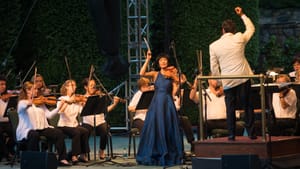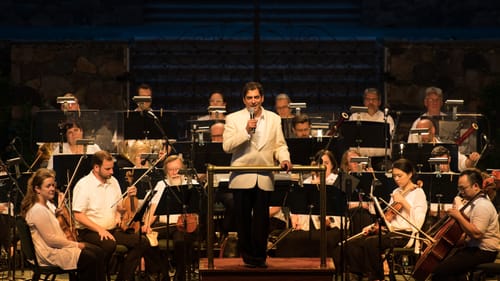Stay in the Loop
BSR publishes on a weekly schedule, with an email newsletter every Wednesday and Thursday morning. There’s no paywall, and subscribing is always free.
Music for violin and fireflies
Delaware Symphony Orchestra at Longwood Gardens

Over a thousand concertgoers gathered Sunday evening to hear the Delaware Symphony Orchestra (DSO) play Longwood Gardens. In a change from their not-every-summer policy, the renowned Kennett Square horticultural mecca presented this fine regional orchestra in its second successful summer outing.
Maestro David Amado opened with back-to-back works by Felix Mendelssohn. First, the orchestra played a lovely rendition of the seldom-heard, charming overture from Fair Melusine. Felix wrote it as a birthday gift for his sister Fanny and regarded it highly. The piece comes from the same musical fount as his better-known incidental music to A Midsummer Night’s Dream, and both are connected to a story — here, the tale of a water nymph — familiar to the German audience.
Rippling woodwinds, alternating tempi and dramatic shifts in dynamics (presaging Wagner) — with horn motifs that prefaced the Brahms later in the program — made for a perfect musical starter. It was filled throughout with water motifs; that Mendelssohn was studying painting at the time he wrote the work is evident in the tone painting the symphony so elegantly depicted.
Speedy solo
The orchestra then welcomed Jennifer Koh, who has previously appeared with the DSO and will return in September for Serenade, Leonard Bernstein’s only composition for violin and orchestra. Koh dipped into the canon for Mendelssohn’s Violin Concerto in E minor, the composer’s last major orchestral work and one of the greatest in the limited violin/symphony repertoire.
From the start, Koh attacked the piece with her trademark energy and passion but at surprising speed, taking most of its first and third movements at a disconcertingly breakneck pace. Even the lyrical and heartbreaking second movement clipped along in what seemed like a single musical breath.
The interpretation showed off her highly praised and dazzling virtuosity. Yet it never allowed listeners — or even the orchestra, for that matter — a real entry into the core of this beloved, highly emotional piece.
The concerto’s iconic status means great players like Koh want to put a stamp on it. She was Musical America’s 2016 Instrumentalist of the Year, and she amply demonstrated the masterful technique that earned her that accolade. An astounding technician, she seemed to feel the music throughout her body, but this inward-facing performance belonged solely to her. Thrilling as she sometimes was, I found myself wishing often to hear more of Mendelssohn’s Mendelssohn rather than Koh’s.

En plein air
The program’s second half differed vastly in emotional and musical affect and effect. Brahms’s Serenade No. 1 — the composer’s first major orchestral work — is perfectly suited to the outdoors. Though written 20 years before the composer would dare to write something he called a symphony, the piece is truly symphonic in scope and length.
This winning suite is filled with approachable music that — as Amado said in his remarks — takes issue with Brahms’s “musical curmudgeon” reputation. Filling it with gay dances, melancholy charm, and patterns of light and dark, Brahms wrote the work shortly after the death of his great friend Robert Schumann.
Throughout, especially beautiful passages for winds and horns rise from the orchestra, dispatched with aplomb by DSO’s first-chair players: intricate bassoon solos, the calls of hunting horns, dancing flute sections, a haunting oboe, the plaintive clarinet. The work’s six sections flowed seamlessly in an expansive, exploratory performance that retained its forward motion. I sometimes lost track of the movements, content to flow with the music.
Though no outdoor venue can match the purity of concert-hall acoustics, at Longwood the sound was well mixed; throughout the evening, all the orchestra sections came through clearly. A chorus of birds trilling with the flutes in Fair Melusine must have agreed.
Programmatically, it might seem obvious to end the evening with a flashy concerto for the virtuoso soloist. But Amado’s instinct to end with Brahms was correct. In the Mendelssohn, the soloist molded the composer to her vision. But for the closing piece, Amado never forced or pushed the work, allowing it to breathe. He also let the audience breathe with it as he led the orchestra in a perfectly calibrated performance with the musical space to hear Brahms’s voice.
This nimble orchestra continues to display its mettle and musicianship under the baton of its excellent conductor. At Longwood, as the sky darkened, the amphitheater filled with sparkling fireflies; it was perfection to be there listening to DSO’s night music.
What, When, Where
Delaware Symphony Orchestra. Overture from Fair Melusine, Op. 32, and Violin Concerto in E minor, Op. 64, by Felix Mendelssohn; Serenade No. 1 in D Major, Op. 11., by Johannes Brahms. David Amado, conductor; Jennifer Koh, violin. July 8, 2018, at Longwood Gardens, 1001 Longwood Road, Kennett Square, Pennsylvania. (302) 656-7442 or delawaresymphony.org.
Sign up for our newsletter
All of the week's new articles, all in one place. Sign up for the free weekly BSR newsletters, and don't miss a conversation.

 Gail Obenreder
Gail Obenreder